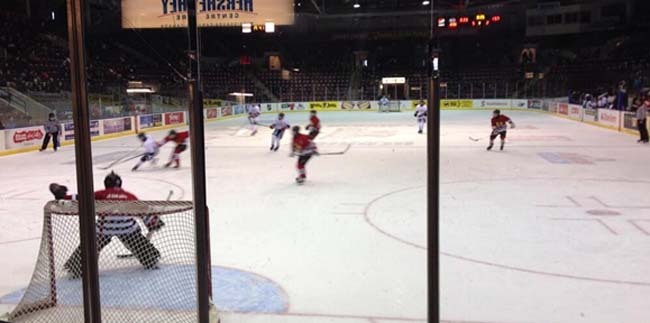Being a team player the focus of this year’s Little NHL

By Rick Garrick
This year’s 44th Annual Little NHL (Native Hockey League) tournament is incorporating a focus on team players instead of star players.
“Let’s play to have fun,” says Whitefish River Chief Franklin Paibomsai, whose community is co-hosting the tournament along with Aundeck Omni Kaning. “Let’s recognize that (with) our Anishinabe families, our Anishinabe children, our values, our customs and traditions, we’re all stars. We all have that ability to make the best of who we are.”
Aundeck Omni Kaning Chief Patsy Corbiere agrees, noting the Little NHL was not focused on competition when it was founded in 1971.
“It was about kids playing hockey, interacting with the different communities and having fun,” Corbiere says. “So what we tried to do was to put more effort into letting the children know they are all all-stars, every one of them.”
Paibomsai says the players have an opportunity to be stars in other tournaments, noting that about 95 per cent of those who register for the Little NHL play in a variety of leagues and tournaments.
“In all those other tournaments, they pick game stars,” Paibomsai says. “The concept of a game is about a team, so we think they see enough of that already about the player who gets picked on each team — the defensive player or the most offensive player — and the rest of the kids get left behind.”
The Little NHL is scheduled for March 16-20 at the Hershey Centre, Iceland Mississauga and Tomken Arena in Mississauga.
“Iceland has four arenas — you can watch so many different games in a day in one centre without leaving,” Paibomsai says. “It’s nice to go to one rink and be able to watch so many games. I can watch a novice game and go across and see an atom game. You can see where the exciting game is — you see a lot of people at the centre and you can feel the vibe in there. I just love being around that good vibe.”
Paibomsai says the Little NHL has achieved “amazing growth” over the years — 167 teams participated in last year.
“One of the areas we are seeing a lot of growth is in the girls game,” Paibomsai says. “The girls game is growing and we are proud to have atoms, peewees, bantams and midgets in the girls program.”
Corbiere says many teams now have both girls and boys playing together.
“It’s not a gender team anymore,” Cornier says. “They have a lot of mixed teams now.”
Corbiere encourages girls to register their team for the Little NHL.
“We don’t have all the registrations in yet for these teams,” Cornier says. “We just have to get the teams to register; people don’t register almost until two weeks into February.”
Corbiere also called out for sponsors to support the tournament.
“It’s a lot of cost for these tournaments, so we are still looking for sponsors,” Cornier says. “Individual teams are looking for sponsors too.”
Corbiere says the Little NHL and sports in general provides a positive outlet for youth.
“When my son was young, we kept him in sports all the time, from the summer (with) baseball and hockey (in the winter),” Corbiere says. “If they meet kids from other communities, sometimes we tie in to other tournaments with some of those other communities that some of those teams go to. People, it’s almost like pen pals, meet at these tournaments and intertwine and they get to know more about the diversity of other First Nations.”
Paibomsai believes in providing youth with opportunities just as he was provided with opportunities when he was a youth.
“I have to pay it forward,” Paibomsai says. “There were people who looked after me, Jimmy McGregor, one of our former chiefs who helped organize this (tournament). They all put some time into me; it’s my time to put some time into the future. And I’m happy to do it.”
Paibomsai says his community’s cross-country running meet, which began three years ago, is an example of how youth can achieve success when provided with opportunities.
“We have a school of only 40 kids,” Paibomsai says. “Last year we had over 200 kids come to our meet. People tell us, that small cross-country run, that means something to people. Keep it up.”


